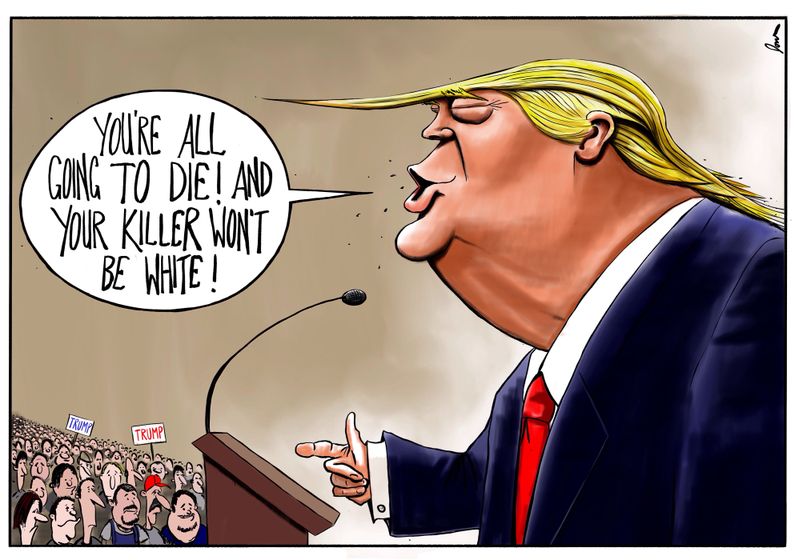
The three members of a Kansas terrorist cell convicted of a 2016 plot to detonate simultaneous car bombs at an apartment complex housing Somali immigrants are now facing sentencing. The lawyers for one of the convicted terrorists, Patrick Stein, are making a plea for a more lenient sentence.
By citing President Donald Trump’s rhetoric.
That’s right: Stein’s lawyers are arguing that the judge should consider how Trump’s words fanned the flames of Stein’s fear and hatred of Muslims, which he learned from and had reinforced by the internet and conservative talk shows, when deciding their client’s sentence.
You can read their sentencing memorandum by following this link. As attorneys James Pratt and Michael Schultz argue:
Patrick Stein was afraid of the Muslim refugees that had come to live in the western Kansas towns of Liberal, Dodge City, and particularly Garden City, Kansas.
Patrick was afraid of Muslims because of what he read about them on the internet and the videos he watched on YouTube. … Patrick’s knowledge of the Quran, the Muslim holy book, came directly from the internet and conservative talk-show hosts such as Sean Hannity and Michael Savage. Patrick himself had never read the Quran, nor had he participated in a comparative study of any religion.
All of Patrick’s exposure to the Muslim religion has been negative – by choice, through the media to which he exposed himself …
And by the poisonous and paranoid political swamp in which Stein, described by his lawyers as “an early and avid supporter for Donald Trump,” wallowed. That swamp echoed with the anti-Muslim bile vomited up by Fox News hosts like Sean Hannity and talk-radio bigots like Michael Savage.
The fear that it inspired was stoked and amplified by the opportunism of the Kansas Republican Party, which produced campaign mailers like the one below. Gary Barker, executive director of the Kansas State Republican Party, explained that this mailer, and others like it, were distributed across the state because polling showed it was “a positive issue for Republicans.”

As Stein’s lawyers put it:
2016 was “lit.” The court cannot ignore the circumstances of one of the most rhetorically mold-breaking, violent, awful, hateful and contentious presidential elections in modern history, driven in large measure by the rhetorical China shop bull who is now our president.
They go on to argue that Trump’s appeal for people like Stein, was as “the voice of a lost and ignored white, working-class set of voters,” and that the eventual president’s words had a particularly powerful effect on their client:
Trump’s brand of rough-and-tumble verbal pummeling heightened the rhetorical stakes for people of all political persuasions. A personal normally at a 3 on a scale of political talk might have found themselves at a 7 during the election. A person, like Patrick, who would often be at a 7 during a normal day, might “go to 11.” See SPINAL TAP.
In their effort to secure a lighter sentence for their client, Stein’s attorneys make one last pitch. Acknowledging that the FBI disrupted the plot before it was carried out, his lawyers argue that, thanks to Trump’s victory, Stein and his fellow conspirators would have shelved their planned terrorist attack.
Trump’s win changed everything, and it is reasonable to speculate that it would have changed things among the defendants as well. The urgency for action would be gone. The feeling of a losing battle would be gone.
In short, Stein’s lawyers argue that their client wouldn’t have become a full-fledged terrorist. He wouldn’t have gone through with the plan to slaughter innocent Somalis after all.
Because Trump was the terrorist’s candidate. And Trump won.